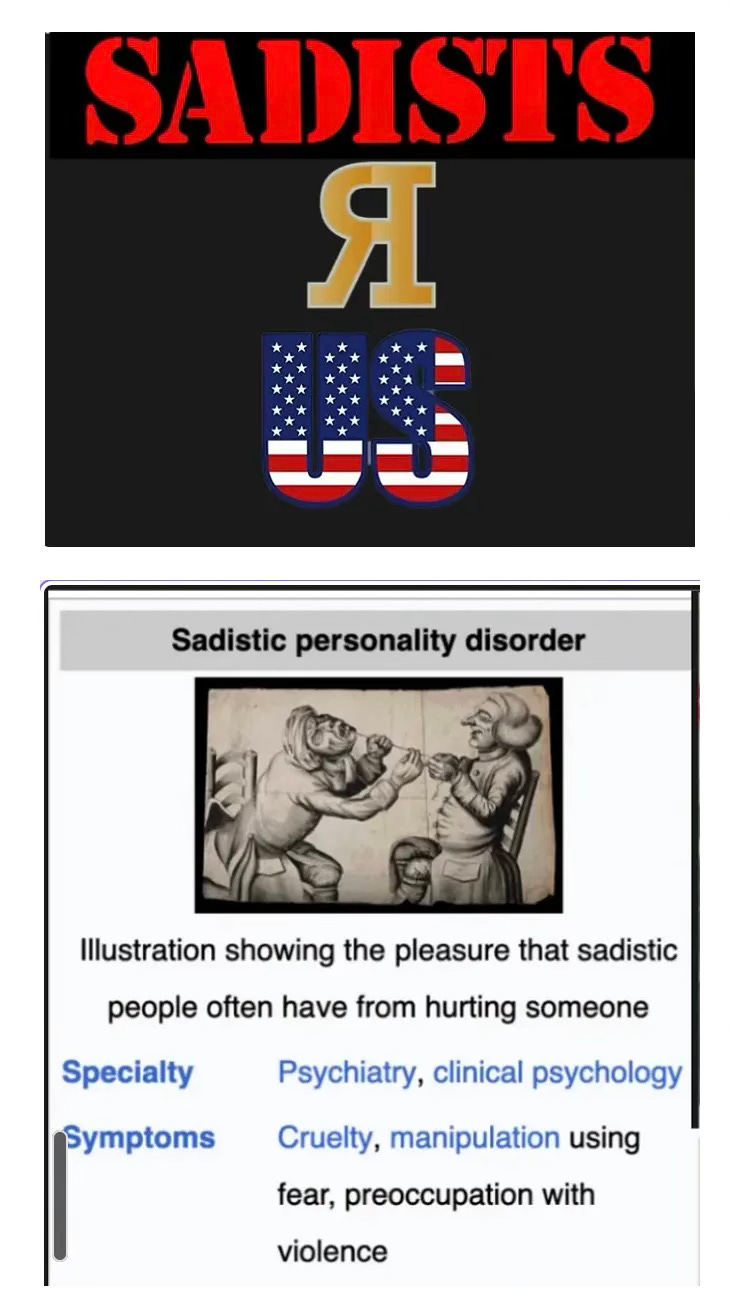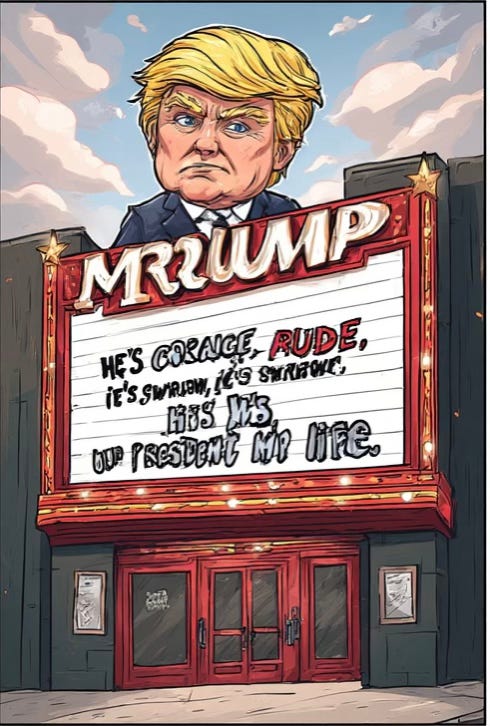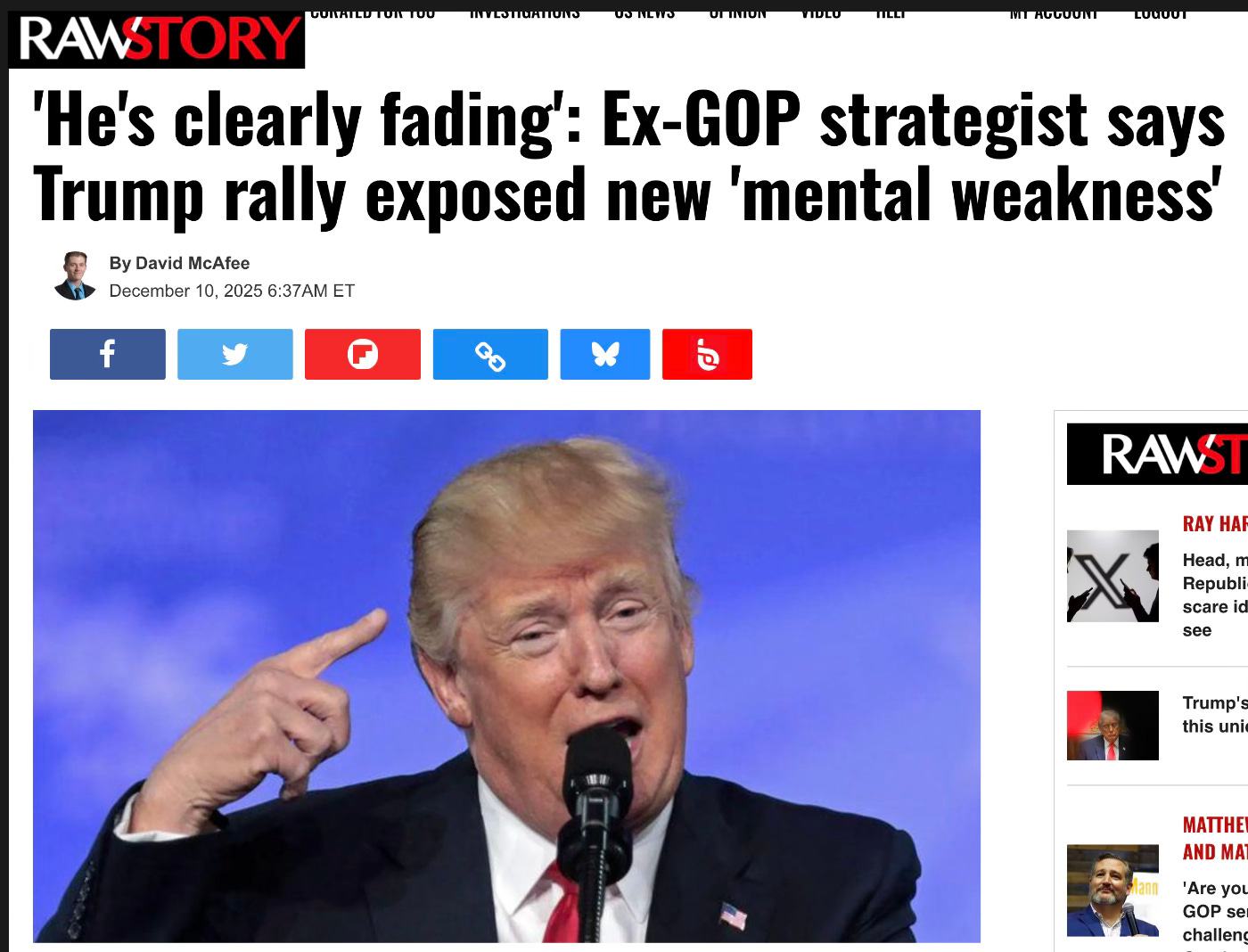Hal Brown's Substack (fomerly Hal Brown's Blog)
This is a blog with my opinions on politics, psychology, and pop culture.
February 7, 2026
Why my Substack newsletter is called "A Beta Brain:
Hal's Substack links all in one place
This is my newsletter: https://halbrown.substack.com/
These are the links I used to have on the bottom of my Substack: https://halbrown.substack.com/
Subscribe for free to receive new posts.
RawStory: go-to site for breaking news.
Sadists ® US: Trump and The Dark Tetrad
Here's the ICE List - The ICE List is an open journalistic project, created by Crust News, aimed at collecting and sharing information that can hold ICE members legally accountable.
.., .
December 9, 2025
As if being a foul-mouthed sadistic malignant narcissist isn't enough, he's a foul-mouthed sadistic misogynistic malignant narcissist. He's crude, he's rude, he's shrewd, and they love him for this.
As if being a foul-mouthed sadistic malignant narcissist isn't enough, he's a foul-mouthed sadistic misogynistic malignant narcissist.
He's crude, he's rude, he's shrewd, and they love him for this.
Below is my comment to this RawStory article:
Here’s the excerpt which promted me to go to Perchance AI Illustrator and ask for a cartoon of Trump with garbage coming out of his mouth.
But the president’s focus shifted to the reporter in question, and he pointed a finger.
“Hey, you’re going to have to take it easy with that thing,” he scolded. “It’s a government plane, but I like to take care of it.
Trump has repeatedly clashed with reporters in recent weeks, particularly women journalists. About a month ago, Trump snapped at Bloomberg reporter Catherine Lucey on Air Force One after she asked the president about the Jeffrey Epstein files. He responded by calling her a “piggy.”
Just before Thanksgiving, the president also called New York Times reporter Katie Rogers “ugly” in a Truth Social post.
Subscribe for free to receive new posts and support my work.
I also put a link to “Sadists ® US: Trump and The Dark Tetrad: t should be obvious that Trump is an example of someone who has all of the traits of The Dark Tetrad: narcissism, psychopathy, Machiavellianism, and sadism.” in my comment
Trump takes delight in cruelly mocking both men and women wh dare challenge his Royal Heinieness. If he gets tumescent being orally obnoxious to men, he gets positively wet when he does it to women.
This is the president who is a role model for these men and millions of others.
The two shown below cheered when he attacked Rep. Omar.
On CNN the man in the Persians for Trump t-shirt was shown pumping his fist above his head for more than five seconds.
These people don’t love him in spite of his being crude, rude and shrewd. They love him because he is crude, rude, and shrewd. I’d say that if he was an ordinary performer he could make a fortune taking his show on the road. Wait… come to think of it is is a performer and he has been taking his show on the road.
For example, in Pennsylvania yesterday, what to us was a cringeworthy performance, delighted his audience,
Related: Here’s an article about that speech:
An indication of this I observed that this is true in how, when he was talking about what he calls the Democratic hoax about affordability, he veered into a rant about how many dolls your daughter needs:
Thanks for reading Hal Brown's Substack!
Thanks for reading Hal Brown's Substack! Subscribe for free to receive new posts and support my work.
RawStory: go-to site for breaking news.
Sadists ® US: Trump and The Dark Tetrad
.
Clicking will take you to all my recent Substacks. They cover all the subjects in my title.Thanks for reading my Substack! Subscribe for free, receive new posts by email.
RawStory: go-to site for breaking news.
Sadists ® US: Trump and The Dark Tetrad
I do what I can by protesting and writing these Substacks but how long will people like me even be allowed to do this?
Just a sample below is my Dec. 10th post:
.
December 4, 2025
December 2, 2025
Please save me the trouble of reposting my Substacks here! By Hal M. Brown
It takes me time to copy each of my daily, or occasionally twice daily, Substack essays here on a Google Blogger platform. The formatting has to be changed and I have to do other tweaking. I'd much rather just put them online in one place.
If you read my essays here, as at least, from what I can tell in the stats, a few thousand of you do, it would take you no longer be able to read them on the Substack platform. They are 100% free. You can also make comments there. I usually reply to each comment.
I don't know whether to trust the viewer statistics because I don't understand why I have so many viewers from other countries;I'd appreciate it if you would read what I write here: https://halbrown.substack.com/
If you like my essays it is easy to send in your email address from any of my Substack posts. You will get a link each time I put a new one online. As with this website, my posts are always free.
If you don't want to subscribe you can always do a web search. In Google, Hal Brown Substack works if you don't want to bookmark the website. Of course bookmarking in fine as well.
As the president of the U.S. says in his toxic Truth Social rants, thank you for your attention to this matter...Why my Substack newsletter is called "A Beta Brain:
My original Substack newsletter was simply called Hal Brown's Substack . This was the title that appeared above all the posts. While ot...
-
Hal Brown’s June blog My photo blog is here. For a start this morning check out this Salon article and then read what I had to say abo...
-
This was the the top HuffPost story this morning . It prompted me to spend some time using AI to create an illustration of Cook bending at t...
-
Click image to enlarge. This image was posted on the private Duty 2 Warn Facebook page . It was started on Feb. 1, 2017 by Dr. John D. Gar...























